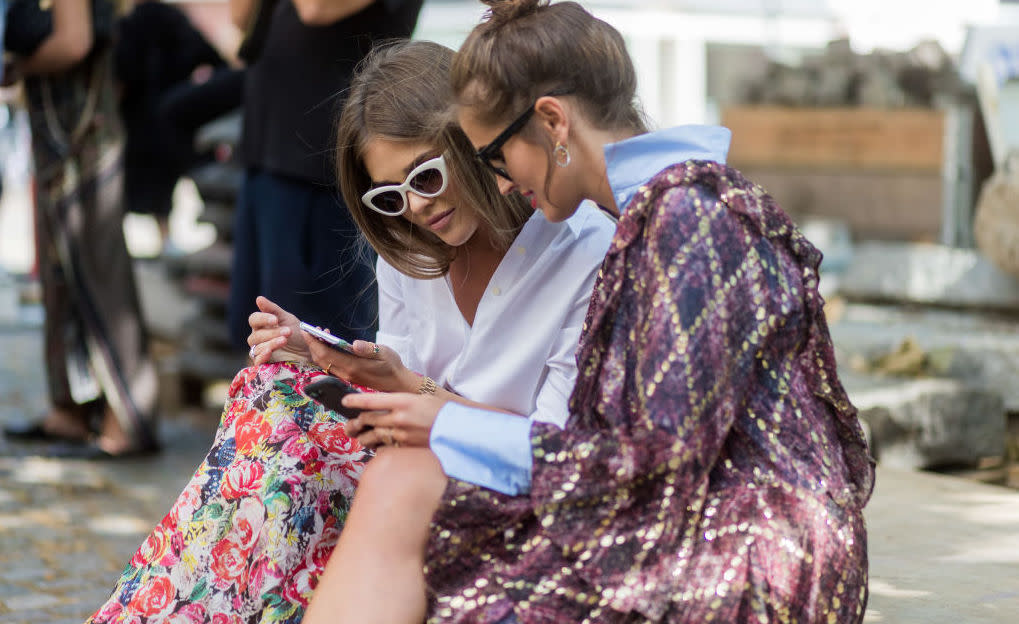Just how worried should we be about blue light and the effect it has on our skin?

Blue light, the light from our LED screens, is something people are becoming increasingly worried about.
A growing number of studies indicate that High Energy Visible (HEV) light may lead to pigmentary disorders and premature ageing.
But with millennials checking their phones up to 150 times a day, how can we shield our skin from the effects of blue light?
And, is it really something we need to worry about?
Is blue light harmful for my skin?
Blue light sits between UV rays (emitted from the sun) and infrared light (found in heat) – two damaging acronyms we’ve all done our homework on.
But unlike the latter, the effects of blue light cannot be softened through the use of SPF.
A recent study published by the US National Institute of Health’s National Library of Medicine suggests that exposure to blue light could accelerate the ageing process.
Further research conducted by Estée Lauder supports the theory, as Vice President of Skin Biology and BioActives, Dr. Nadine Pernodet, revealed: “The much bigger damage that blue light creates is at night, when skin is ‘tricked’ into thinking it is still daytime instead of getting the signal that it is time to enter their night time rhythm.”
“The result of this desynchronisation is that skin cells are not entering the night time repair mode necessary for skin to naturally recover and this is going to accelerate ageing tremendously.”

Dr Stefanie Williams MD from Eudelo Dermatology & Skin Wellbeing, explains: “If exposed to significant amounts of blue light at night, you may find it more difficult to fall asleep (think working on a blue light-emitting laptop in the evening). That’s because it affects the level of melatonin – our sleep hormone.”
According to Dr Williams, evidence to support the theory that blue light accelerates the ageing process has increased in recent years.
“A study hot of the press revealed molecular and cellular changes in human skin cells (dermal fibroblasts) exposed to artificial visible light similar to the light emitted by electronic devices,” Dr Williams told Yahoo Style UK. “The changes observed included mitochondrial damage (mitochondria are our cells’ ‘powerhouses’), impairment of cell growth, ATP (energy) release and collagen production.”
In simpler terms, she concludes: “The authors conclude that this may impede normal cellular functions and may even contribute to premature skin ageing.”
How can I protect my skin from blue light?
Honestly, we’re not going to give up our social media habits anytime soon. But there are some steps we can take to reduce the effects of blue light.
Dr Williams advises reducing exposure from electronic devices with blue light filters while apps designed to emit less blue light are also available to download. Software programme f.lux may well be worth downloading.
In a bid to help laptop users get a good night’s sleep, the software is designed to filter out blue light and swap it for skin-friendly amber tones on your display screen when it approaches the evening.

Another option is to apply protection, like you would with an SPF cream.
Enter, bareMinerals’ new moisturiser. Boasting a broad spectrum SPF (covering both the UVB and UVA range) the lightweight cream can be worn throughout the day or applied before bed – perfect for protecting your face during late-night Netflix sessions.

Follow us on Instagram and Facebook for non-stop inspiration delivered fresh to your feed, every day. For Twitter updates, follow @YahooStyleUK.
Read more from Yahoo Style UK:
Beauty headliners: The must-pack beauty products for festival season
July beauty launches: The makeup, skincare and fragrance products to buy this month
Foundation of youth foods: 6 foods that keep us looking young


